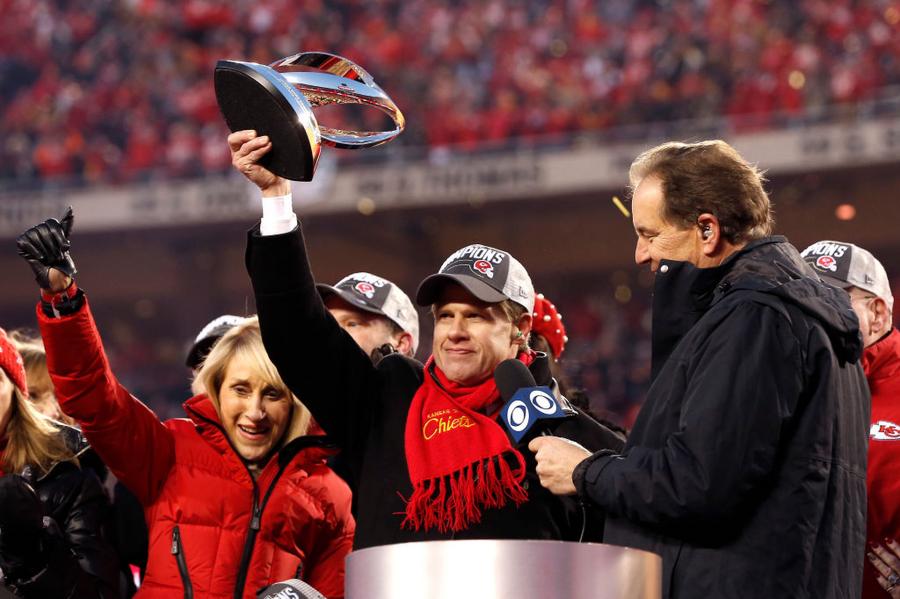The Kansas City Chiefs are owned by the Hunt family. The team's CEO and Chairman is Clark Hunt. Thanks to his ownership in the team, Clark Hunt's net worth is $2 billion. The Hunt family has owned the team since its inception, and prior to their 2020 win, the Chiefs hadn't won a Super Bowl since 1969, when Clark was just four years old.
So, how did Clark Hunt and his family earn their multi-billion fortune, which enabled them to own the Kansas City Chiefs today?
Team Origin
The Chiefs have been in the Hunt family since the team began. The family fortune can be traced to Clark's grandfather, oil tycoon H.L. Hunt. According to legend, H.L. gambled his last $100 into $100,000 in winnings. He then used those winnings to purchase properties, eventually leading to the discovery of the East Texas Oil Field, one of the world's largest oil deposits.
H.L.'s son Lamar Hunt (Clark's dad) was passionate about professional sports. His dream was to own an NFL team. After being rejected in several attempts to acquire an NFL team, Lamar teamed up with a group of fellow disgruntled tycoons who had been rejected by the NFL to form the American Football League. In 1960, Lamar founded a franchise that he called the Dallas Texans. In response, the NFL jump-started its own Dallas-based franchise, a team they called the Dallas Cowboys.
The competition for fans between the two Dallas teams forced Lamar to move the Texans to Kansas City in 1963. Upon moving, he renamed the team the Chiefs.
In 1966, the NFL and AFL finally agreed to merge. With the merger, the league decided to launch an annual game that would match up the best team in the NFL against the best team in the AFL. They did not have a name for this annual game until in a letter, Lamar Hunt referred to it as the "Super Bowl." The name stuck. Today, the AFC Championship trophy is named after Lamar Hunt.
Lamar also created Major League Soccer, as well as the North American Soccer League. Additionally, he co-founded World Championship Tennis. Lamar died in 2006. Upon his death, his empire was inherited by his four children. Of those four children, Clark was elected by the siblings to be the Chairman and CEO of the Chiefs.

David Eulitt/Getty Images
Clark Hunt
Clark Hunt was born on February 19, 1965, in Dallas. He graduated from Southern Methodist University in 1987 at the top of his class in business school. Upon graduating, he worked as an investment banker at Goldman Sachs. After just two years, he moved back to Dallas to work for his dad. A year before Lamar's death, he granted control of the Hunt Sports Group to Clark, who had recently turned 40 years old.
In addition to the Chiefs, the Hunt Sports Group owns FC Dallas. They previously had a stake in the Chicago Bulls and Columbus Crew. The family's sports empire is worth more than $3 billion, with Clark's personal net worth sitting at about $2 billion.
Collectively, the Hunt family is worth around $16 billion. Their extended family is one of the richest families in the world. And thanks to the 15 children sired by patriarch H.L. Hunt by three wives, the family is extremely extended.
You probably know someone who has a hard time separating their work and home lives. Clark and his wife Tavia embody that – the couple and their three children have a six-bedroom apartment atop the owner's box at Arrowhead Stadium. They also own a home in Dallas.
/2021/02/GettyImages-1299625051.jpg)
/2016/02/len-dawson.jpg)
/2015/07/GettyImages-508439098.jpg)
/2014/10/khan.jpg)
/2018/11/GettyImages-138489848.jpg)
/2012/08/Andy-Reid.jpg)
/2023/04/Werner-Herzog.jpg)
/2015/09/GettyImages-487239664.jpg)
/2010/03/Chad-Johnson.jpg)
:strip_exif()/2020/06/taylor.png)
/2020/09/Boris-Becker.jpg)
/2012/09/Robin-Wright.jpg)
/2022/09/carlos-alcaraz.jpg)
/2013/02/Tony-Gonzalez.jpg)
/2024/02/jannick.jpg)
/2020/09/Pete-Townshend.jpg)
/2020/11/Roger-Daltrey.jpg)
/2011/01/Mira-Sorvino.jpg)
/2020/05/Phaedra-Parks.jpg)
/2011/01/GettyImages-486584191.jpg)
/2020/07/chaka.jpg)
/2021/08/Billy-Ocean.jpg)
/2010/01/Rafael-Nadal.jpg)